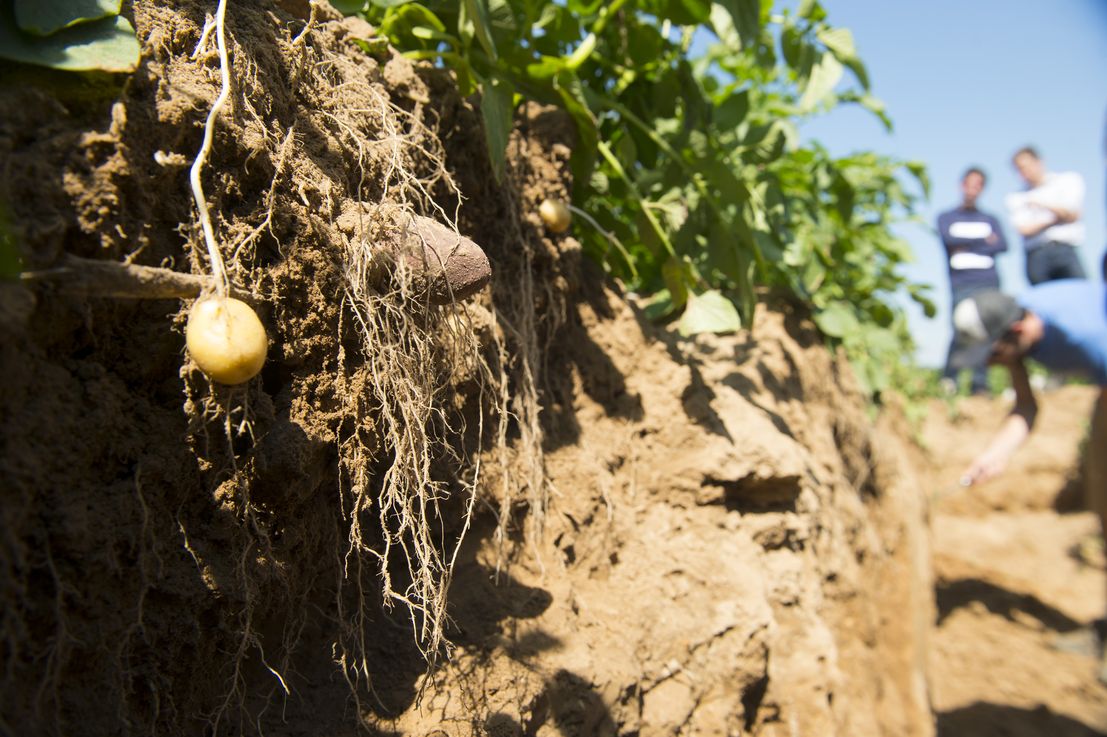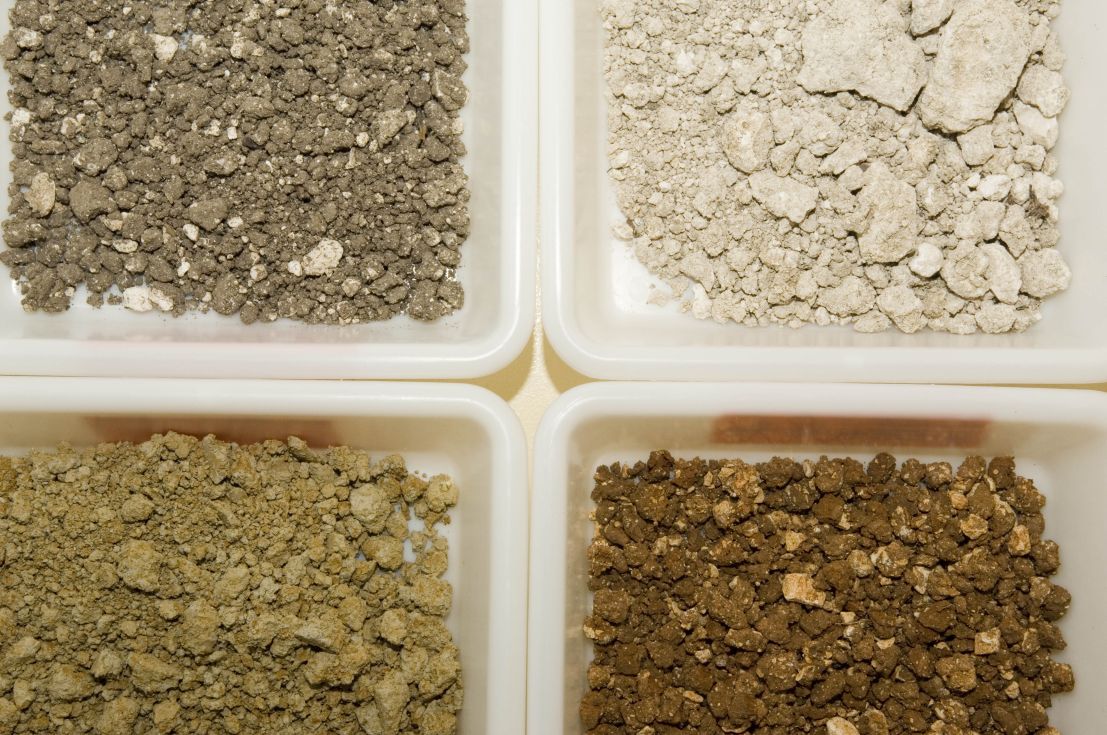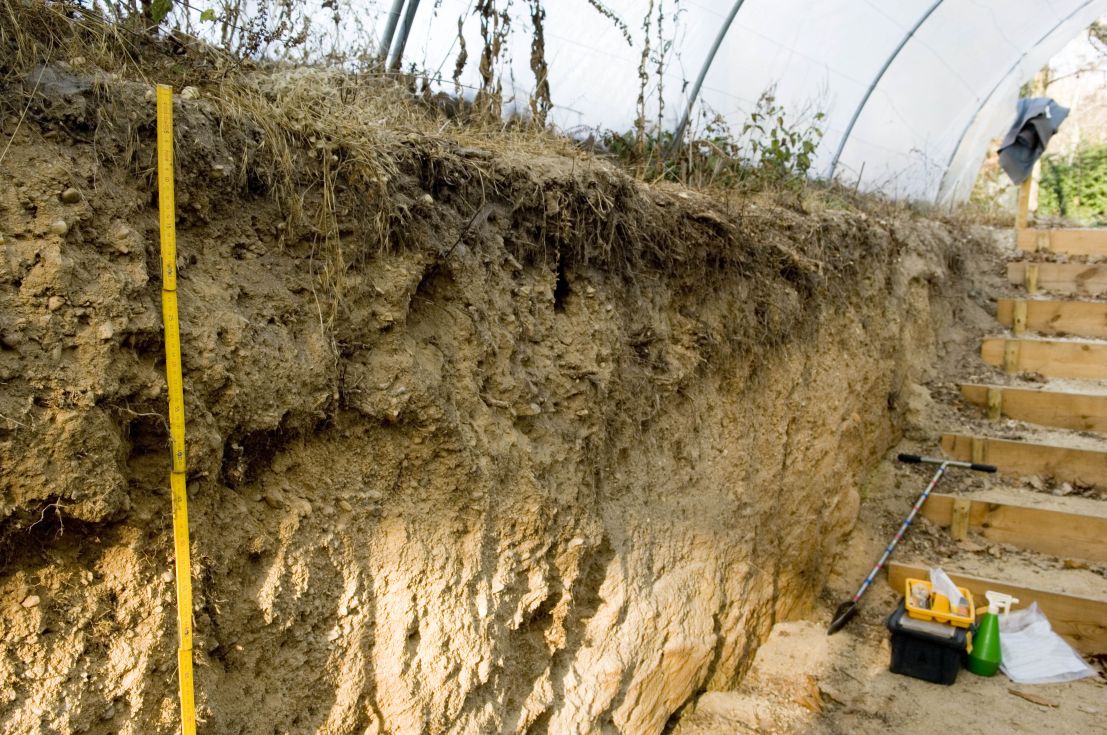
Join the 4‰ Initiative Soils for food security and climate
Partager la page
Building on solid, scientific documentation and concrete actions on the ground, the “4% Initiative : soils for food security and climate” aims to show that food security and combating climate change
Join the 4‰ Initiative Soils for food security and climate
Building on solid, scientific documentation and concrete actions on the ground, the “4‰ Initiative : soils for food security and climate” aims to show that food security and combating climate change are complementary and to ensure that agriculture provides solutions to climate change. This initiative consists of a voluntary action plan under the Lima Paris Agenda for Action (LPAA), backed up by a strong and ambitious research program.

- Did you know?
A "4‰" annual growth rate of the soil carbon stock would make it possible to stop the present increase in atmospheric CO2. This growth rate is not a normative target for every country but is intended to show that even a small increase in the soil carbon stock (agricultural soils, notably grasslands and pas- tures, and forest soils) is crucial to improve soil fertility and agricultural production and to contribute to achieving the long-term objective of limiting the temperature increase to +1,5/2°C, threshold beyond which the IPCC indicates that the effects of climate change are significant. This initiative is intended to complement the necessary efforts to comprehensively reduce global greenhouse gas emissions.
Agricultural soils to ensure food security
One simple fact:
- Soil degradation poses a threat to more than 40% of the Earth’s land surfaces and climate change is accelerating this rate of soil degradation and threatening food security.
- Disastrous consequences for food security and family farmers.

Our capacity to feed 9.5 billion people in 2050 in a context of climate change will depend in particular on our ability to keep our soils alive. The health of soils, for which sufficient organic matter is the main indicator, strongly controls agricultural production. Stable and productive soils affect the resilience of farms to cope with the effects of climate change.
Primarily composed of carbon, the organic matter in soils plays a role in four important ecosystem services: resistance to soil erosion, soil water retention, soil fertility for plants and soil biodiversity. Even small changes of the soil carbon pool have tremendous effects both on agricultural productivity and on greenhouse gas balance.
Maintaining organic carbon-rich soils, restoring and improving degraded agricultural lands and, in general terms, increasing the soil carbon, play an important role in addressing the three-fold challenge of food security, adaptation of food systems and people to climate change, and the mitigation of anthropogenic emissions. To achieve this, concrete solutions do exist and need to be scaled up.
- One Vision : The "4‰ Initiative : soils for food security and climate”
The "4‰" Initiative aims to improve the organic matter content and promote carbon sequestration in soils through the application of agricultural practices adapted to local situations both economically, environmentally and socially, such as agro-ecology, agroforestry, conservation agriculture and land- scape management.
- The Initiative engages stakeholders in a transition towards a productive, resilient agriculture, based on a sustainable soil management and generating jobs and incomes, hence ensuring sustainable development.
- Thanks to its high level of ambition, this Initiative is part of the Lima-Paris Action Agenda and contributes to the sustainable development goals to reach a land-degradation neutral world.
- All the stakeholders commit together in a voluntary action plan to implement farming practices that maintain or enhance soil carbon stock on as many agricultural soils as possible and to preserve carbon-rich soils. Every stakeholder commits on an objective, actions (including soil carbon stock management and other accompanying measures, for example index-based insurance, payment for ecosystem services, and so on), a time-line and resources.
- The Initiative aims to send out a strong signal concerning the potential of agriculture to contribute to the long-term objective of a carbon-neutral economy.
What is the added value of the "4‰" Initiative ?
The "4‰" Initiative aims to develop practical measures on the ground that benefit crop and livestock farmers, the first victims of land degradation, and more broadly for the whole world population.
This is a multi-partner initiative involving, in its first stage, all existing partnerships on soils and all stakeholders around two main strands of action:
a multipartner (state and non-state actors) program of actions for better management of soil carbon in order to combat poverty and food insecurity, while contributing to climate change adaptation and mitigation by:
- the implementation of agricultural practices at local level and management of environments favourable to the restoration of soils, to an increase in their organic carbon stock and to the protection of carbon-rich soils and biodiversity;
- the implementation of training and outreach programs to encourage such practices;
- the financing of projects to restore, improve and/or preserve carbon stocks in soils;
- the development and implementation of public policies and appropriate tools;
- the development of supply chains of soil-friendly agricultural products, and so on.
an international research and scientific cooperation programme – "Soil carbon and food security" focused on four complementary research themes:
- study of mechanisms and assessment of the potential for carbon storage in soils across regions and systems;
- performance evaluation of best farming practices for soil carbon and their impact on other greenhouse gases, on food security and on other regulation and production services;
- support of innovation and its promotion by appropriate policies;
- monitoring and estimating variations in soil carbon stock, especially at farmers level.
Joint action by all stakeholders should help attract new funding to the agricultural sector for adaptation to climate change, food security and emission mitigation, and encourage the implementation of adapted development policies and tools.
This Initiative also aims to strengthen existing synergies between the three Rio Conventions (the United Nations Framework Convention on Climate Change (UNFCCC), the United Nations Convention to Combat Desertification (UNCCD), the Convention on Biological Diversity (BDC), the Committee for Food Security (CFS), the Global Soil Partnerphip (GSP), and with the Sustainable Development Goals (SDGs) which will be adopted by the United Nations in September 2015. Desertification, climate change and loss of biodiversity can either interact to pose a threat or, on the contrary, to help bring appropriate solutions to sustainable development. The principles of the 4‰ initiative will fully support the World Soil Charter (1988/2015).
The objective of this Initiative is to encourage stakeholders (state and non-state actors) to get involved in a coordinated effort.
Follow-up to the initiative: the initiative's partners will share the actions they commit to undertaking and the results achieved through a platform. Exchange of views and stocktaking meetings will be held regularly in order to organise the follow-up to this initiative.
- How to contribute ?
Governments and local authorities can undertake to:
✓ implement training programs for farmers and agricultural counsellors which aim to enhance organic matter in soils;
✓ establish adapted public policies and tools in particular to land tenure and sustainable soil management;
✓ support financially development project that helps to develop carbon sequestration;
✓ develop policies to supply agricultural products promoting sustainable management of soils through public procurement, where appropriate.
Development Banks, Donors and private foundations may:
✓ adopt an ambitious goal for development projects facilitating the dissemination and implementation
of agricultural practices to increase, stabilize the rate of organic matter in the soil and preserve carbon-rich soils;
✓ finance development projects, research projects, trainings or the implementation of MRV systems.
International research can develop the four above-mentioned strands of action.
Private companies may undertake to:
✓ encourage the supply of products resulting from practices which are beneficial for the soil carbon, as they do against deforestation;
✓ engage in soil rehabilitation projects.

- Farmers' and Food Producers’ organizations can contribute to and encourage the adoption of new practices to store a larger amount of carbon while increasing soil fertility and resilience, in collaboration with research and NGOs.
- NGOs will have a key role to play in identifying, adapting and facilitating the dissemination of these good practices and ensuring that they meet producers' expectations, in collaboration with research and farmers' organizations.
Milestones
- 16 September 2015 International Conference on “Agriculture and agricultural soils facing climate change and food security challenges: public policies and practices” at the OECD
- 12-15 October 2015 Committee on Food Security in Rome - FAO
- 12-23 October 2015 UNCCD COP12 Desertification in Ankara
- 1 December 2015 COP21 in Paris : official launch of the "4‰ Initiative : soils for food security and climate” by signing a joint declaration between all stakeholders
Key figures
24 % of global soils are degraded at various levels, including 50 % of agricultural soils [source: Bai et al., 2013]
1 500 billion tonnes of carbon are stocked in soil organic matter, which is twice more carbon than atmospheric CO2 [source : IPCC, 2013]
1,2 billion tonnes of carbon could be stocked every year in agricultural soils which represents an annual rate of 4‰ compared to the surface soil horizon [source : IPCC, 2014]
Every years crop production in Africa, Asia and South America could increase by millions, by increasing 24/40 soil organic matter by 1 tonne/ha [Lal , 2006]
1,2 billion USD is the economic loss in crop production due to soil degradation [FAO, 2006]
- How to support the "4‰" Initiative?
- Who can join ?
States, local authorities, companies, farmers organizations, NGO, research institutes can join.
- How to participate ?
1Register at: 4p1000.dgpe@agriculture.gouv.fr
2 Register your commitments here: http://climateaction.unfccc.int (target, dedicated resources, calendar, area of land concerned, number of farmers concerned, and much else)
En savoir plus :